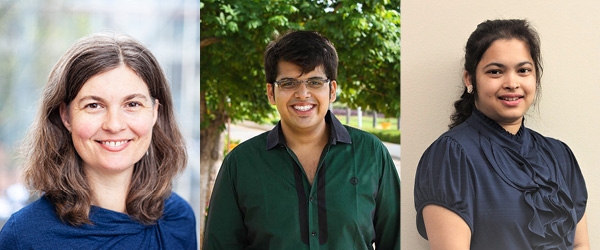Meet the 2021 NITC Students of the Year: Kelly Rodgers, Darshan Chauhan and Apy Das

The Outstanding Student of the Year award is presented during the Council of University Transportation Centers (CUTC) banquet at each annual meeting of the Transportation Research Board, where the U.S. Department of Transportation honors an outstanding graduate student from each UTC. Kelly Rodgers will be presented with the award for NITC at the CUTC virtual award ceremony on January 8. See past NITC Students of the Year.
NITC OUTSTANDING STUDENT OF THE YEAR
Kelly Rodgers, PhD Urban Studies, Portland State University
Connect with Kelly on Linkedin
Kelly Rodgers is a Portland State University PhD student in Urban Studies who is studying the use and influence of health indicators in transportation plans. In 2021, Kelly was named the NITC Student of the Year. Kelly has been awarded the Dwight D. Eisenhower Transportation Fellowship three times and twice named a NITC Student Scholar. Kelly is also the Executive Director of Streetsmart, a non-profit research synthesis and resource clearinghouse for integrating health, climate, and equity into transportation. Kelly is the vice-chair of the Institute of Transportation Engineers' Health and Transportation Standing Committee, a member of the Transportation Research Board's Transportation and Public Health Committee, and is an advisory board member of the American Public Health Association's Center for Climate, Health, and Equity. As a member of the Planning for Health Equity, Advocacy, and Leadership (PHEAL) advisory committee, she is promoting the adoption of health equity principles to guide community planning work. In 2021, Kelly co-authored the article, the 2019 Conference on Health and Active Transportation: Research Needs and Opportunities, published in the International Journal of Environmental Research and Public Health. In the 2022 Transportation Research Board Annual Meeting, she was a lead organizer of the workshop: Do you count if you’re not counted? An exploration of systematic bias in our crash data systems, impacts on vulnerable road users, and implications for research and practice.
Learn more in the NITC Student Spotlight Interview with Kelly.
"As Executive Director of Streetsmart, a research synthesis and resource clearinghouse for integrating climate, health, and equity into transportation, I have been focused on translating systematic reviews to describe which strategies help us achieve our climate, health, and equity goals. I'd also like to expand upon conventional systematic reviews to provide more context-based guidance, such as conducting realist reviews – what works for whom, under what circumstances, and why?"
NITC PhD STUDENT OF THE YEAR
Darshan Rajesh Chauhan, PhD Civil and Environmental Engineering, Portland State University
Connect with Darshan on LinkedIn
Darshan is a Ph.D. Candidate in Civil and Environmental Engineering and Graduate Research Assistant at Portland State University (PSU). His doctoral work with Dr. Avinash Unnikrishnan is on planning and real-time resource allocation in freight logistics systems using robust optimization and reinforcement learning. He is also interested in data analytics and its applications to transportation safety using econometric modeling. He is fascinated by how the field of transportation is an amalgam of various disciplines and is interested in contributing to an area where optimization, data analytics, and civil engineering intersect. He is a student member of ASCE, INFORMS, and ITE. He has served as the Treasurer of STEP, PSU’s ITE student chapter. Before coming to Portland State University, he completed his B.E. (Hons.) in Civil Engineering at BITS Pilani Hyderabad Campus, India.
"I’m currently a PhD candidate and I plan to graduate in 2022. As my academic journey as a student comes to an end, I want to start networking intensively to share the ideas I have learned and developed through my PhD. Some of these conversations might present exciting opportunities through which I can kickstart my transportation engineering career."
NITC MASTERS STUDENT OF THE YEAR
Apy Das, Masters Civil and Environmental Engineering, Portland State University
Connect with Apy on LinkedIn
Apy Das is a Transportation Engineer at the Washington State Department of Transportation, and a recent masters graduate the department of civil and environmental engineering at Portland State University. She got her bachelor of science degree in civil engineering in Bangladesh, where she worked on traffic accident black spots and road safety in the city of Chittagong, Bangladesh. After starting her studies at PSU, she feels grateful to think of it as a great scope to elaborate her understanding and learn more about transportation research work in the US. She is very interested to work for vulnerable road users to build a future with safe road networks to fulfill the goal of Vision Zero. At the same time, she also wants to contribute her knowledge to making a more meaningful and equitable transportation environment for all road users. During her free time, she really enjoys spending time with her loving daughter and reading books to her, cooking her favorite dishes, gardening and traveling.
"I strongly believe that diversity and equity are powerful tools at our disposal – we should make sure that everyone feels included and respected and gets a fair and respectful treatment irrespective of their color, race, gender, economic background and language. This only brings positivity and helps with betterment of human beings."
The National Institute for Transportation and Communities (NITC) is one of seven U.S. Department of Transportation national university transportation centers. NITC is a program of the Transportation Research and Education Center (TREC) at Portland State University. This PSU-led research partnership also includes the Oregon Institute of Technology, University of Arizona, University of Oregon, University of Texas at Arlington and University of Utah. We pursue our theme — improving mobility of people and goods to build strong communities — through research, education and technology transfer.
